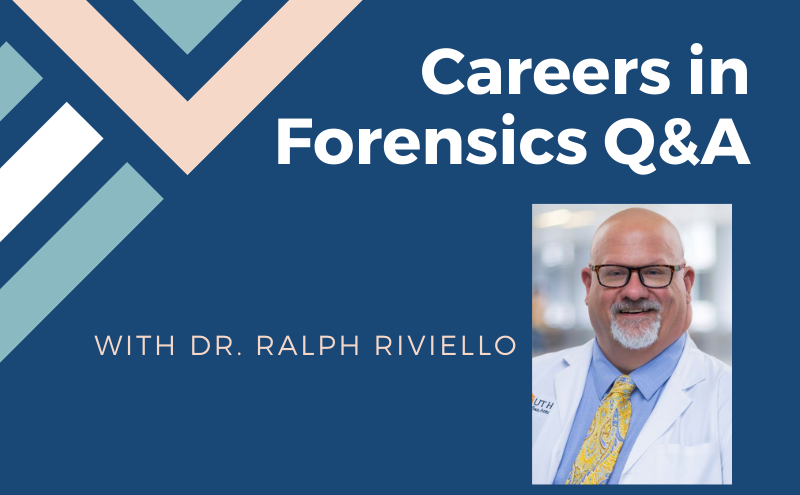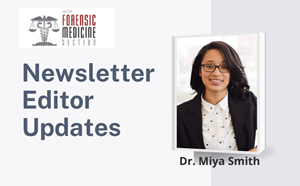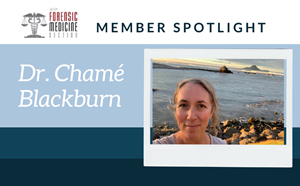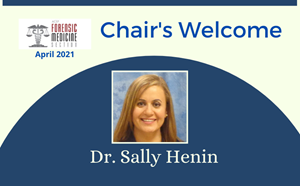
Careers in Forensics Q&A - with Dr. Ralph Riviello
What is your current position?
Currently I am Professor and Chair of the Department of Emergency Medicine at UT Health San Antonio. I also serve as Chair of Emergency Medicine for University Hospital, San Antonio.
How did you get involved in forensic medicine?
Actually, quite by accident. I was working at UVA in Charlottesville and we had a busy adult and pediatric SANE program. Apparently, we needed an adult SANE medical director and the nursing director of the program went to my chair and said, “We want Ralph to be our medical director, can you appoint him?” He told her no, can’t just appoint him, he has to be willing to do it. He asked me. I had no clue what it would involve. I spoke to Sarah, our nurse director and she explained the role and I said sure. I then quickly realized I had no idea what to do, what they did, anything about the exam, findings, etc. I quickly found a SANE course the next month in Richmond and enrolled. I learned a ton in the class.
When I moved to Philadelphia, I became the SANE Medical Director at my hospital and became very active in the field and the community. About a year later, one of the schools in Philly started a Master’s Program in Forensic Medicine. I enrolled and was accepted. It was a 2-yr course, first year was 1 weekend a month; 2nd year was online.
What training/skills do you need in order to have a career in forensics?
I think first and foremost, you have to have a passion to do this work and be empathic. You have to understand the implications and effects of violence and injury and have to understand what you can opine about and what is speculation. You should avoid speculation. You should also throw any preconceived notions you have on DV, SV, abuse, gun violence, etc, out the door. There is no place for it here. You have to be open minded and be victim-centered and trauma-informed. Interpreting an injury or a sexual assault exam finding and testifying about it, adds to the healing process of the survivor as well as helps with closure through the criminal justice process.
There are probably a few things you should do. First would be to pay attention to the chapters in our text books on child abuse, sexual assault, domestic violence, etc. Then I recommend take a Sexual Assault Forensic Examiner Course. There are several in communities and IAFN offers one on line. While you are at, become an associate member of IAFN. It allows you to partake in webinars and training and get updates. If possible, you can look for a Master’s Program to enhance your knowledge and credibility especially if providing testimony or expert work. Keep an eye out for conferences specifically related to forensic topics. There aren’t a ton, but they do pop up. Sadly, they aren’t often completely medically focused, but you can still learn a lot. Look for specific opportunities that our state may offer, like child abuse practicums, legal courses, etc. And lastly, work within your community. Reach out to your rape crisis center, DV center, victim advocacy center, etc and see how you can get involved. A lot of times it is being at the right place at the right time and just stepping up to volunteer for things.
What’s your favorite thing about your job?
There are a lot of favorite things. I like helping patients and helping them understand what happened to them and how they can heal from it and get past. I also love teaching all kinds of learners about the exam process, evidence collection, strangulation, etc. I also like working with the multidisciplinary team. It brings you in contact with people and [allows you to] work together [with individuals] who[m] you probably would have never had the opportunity to [interact]. I have several friends who are DA’s, lawyers, police officers, detectives, advocates, CEOs of non-profits. I have learned so much from them and really respect the jobs they do. And finally, I like contributing knowledge and science to the field.
What is your least favorite thing about your job?
My least favorite thing has to be the suffering of victims and any violence in children. Each of those are very tough to deal with and the child victims often make me mad, especially when I hear horrendous stories of what happened. That is why, resilience and self-healing and recharging is so important to this work.
What advice do you have for medical students, residents, and young physicians considering forensics?
I think the best advice is first be the best in the field you choose. Whether it is an EP, pediatrician, OB-Gyn, or family practitioner, you have to be strong in your discipline in order to specialize/focus in anything else. Next take any educational opportunities you can, forensic electives, digital photography courses, medical examiner elective, etc. Being an emergency physician totally helps in this field and having the basic knowledge of EM, gives you skills to do forensic work. And finally, look for a mentor. They can come in all forms and are really the best way to learn, and to gain wisdom and insight.



